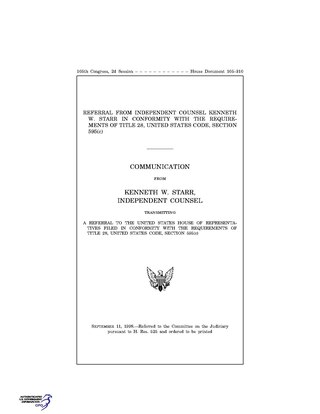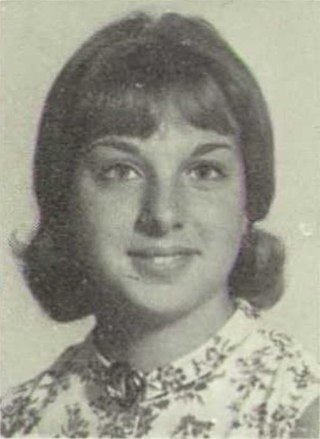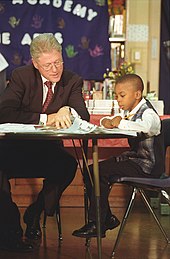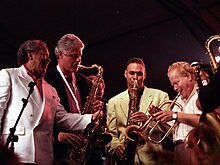
William Jefferson Clinton is an American politician who served as the 42nd president of the United States from 1993 to 2001. A member of the Democratic Party, he previously served as Governor of Arkansas from 1979 to 1981 and again from 1983 to 1992. Clinton, whose policies reflected a centrist "Third Way" political philosophy, became known as a New Democrat.

Monica Samille Lewinsky is an American activist. Lewinsky became internationally known in the late 1990s after U.S. President Bill Clinton admitted to having had an affair with her during her days as a White House intern between 1995 and 1997. The affair and its repercussions became known as the Clinton–Lewinsky scandal.

Kenneth Winston Starr was an American lawyer and judge who as independent counsel authored the Starr Report, which served as the basis of the impeachment of Bill Clinton. He headed an investigation of members of the Clinton administration, known as the Whitewater controversy, from 1994 to 1998. Starr previously served as a federal appellate judge on the U.S. Court of Appeals for the District of Columbia Circuit from 1983 to 1989 and as the U.S. solicitor general from 1989 to 1993 during the presidency of George H. W. Bush.

The Clinton–Lewinsky scandal was a sex scandal involving Bill Clinton, the president of the United States, and Monica Lewinsky, a White House intern. Their sexual relationship began in 1995—when Clinton was 49 years old and Lewinsky was 22 years old—and lasted 18 months, ending in 1997. Clinton ended televised remarks on January 26, 1998, with the later infamous statement: "I did not have sexual relations with that woman, Ms. Lewinsky." Further investigation led to charges of perjury and to the impeachment of Clinton in 1998 by the U.S. House of Representatives. He was subsequently acquitted on all impeachment charges of perjury and obstruction of justice in a 21-day U.S. Senate trial.

The Starr Report, officially the Referral from Independent Counsel Kenneth W. Starr in Conformity with the Requirement of Title 28, United States Code, Section 595(c), is a United States federal government report by Independent Counsel Ken Starr concerning his investigation of President Bill Clinton. Delivered to the United States Congress on September 9, 1998, the allegations in the report led to the impeachment of Bill Clinton and the five-year suspension of Clinton's law license.

Paula Corbin Jones is an American civil servant. A former Arkansas state employee, Jones sued United States President Bill Clinton for sexual harassment in 1994. In the initial lawsuit, Jones cited Clinton for sexual harassment at the Excelsior Hotel in Little Rock, Arkansas on May 8, 1991. Following a series of civil suits and appeals through the U.S. District Court and the U.S. Court of Appeals from May 1994 to January 1996, Clinton v. Jones eventually reached the United States Supreme Court on May 27, 1997. The case was later settled on November 13, 1998.

Linda Rose Tripp was an American civil servant who played a prominent role in the Clinton–Lewinsky scandal of 1998. Tripp's action in illegally and secretly recording Monica Lewinsky's confidential phone calls about her relationship with President Bill Clinton caused a sensation with their links to the earlier Clinton v. Jones lawsuit and with the disclosing of intimate details. Tripp claimed that her motives were purely patriotic, and she avoided a wiretap charge by agreeing to hand over the tapes.
"Vast right-wing conspiracy" is a phrase popularized by a 1995 memo by political opposition researcher Chris Lehane and then referenced in 1998 by the then First Lady of the United States Hillary Rodham Clinton, in defense of her husband, President Bill Clinton, characterizing the continued allegations of scandal against her and her husband, including the Lewinsky scandal, as part of a conspiracy by Clinton's political enemies. The term has been used since, including in a question posed to Bill Clinton in 2009 to describe verbal attacks on Barack Obama during his early presidency. Hillary Clinton mentioned it again during her 2016 presidential campaign.

Bill Clinton, the 42nd president of the United States, was impeached by the United States House of Representatives of the 105th United States Congress on December 19, 1998, for "high crimes and misdemeanors". The House adopted two articles of impeachment against Clinton, with the specific charges against Clinton being lying under oath and obstruction of justice. Two other articles had been considered but were rejected by the House vote.

Sidney Stone Blumenthal is an American journalist, political operative, and Lincoln scholar. A former aide to President Bill Clinton, he is a long-time confidant of Hillary Clinton and was formerly employed by the Clinton Foundation. As a journalist, Blumenthal wrote about American politics and foreign policy. He is also the author of a multivolume biography of Abraham Lincoln, The Political Life of Abraham Lincoln. Three books of the planned five-volume series have already been published: A Self-Made Man, Wrestling With His Angel, and All the Powers of Earth. Subsequent volumes were planned for later.

In political studies, surveys have been conducted in order to construct historical rankings of the success of the presidents of the United States. Ranking systems are usually based on surveys of academic historians and political scientists or popular opinion. The scholarly rankings focus on presidential achievements, leadership qualities, failures and faults. Popular-opinion polls typically focus on recent or well-known presidents.
In the United States, presidential job approval ratings were first conducted by George Gallup to gauge public support for the president of the United States during their term. An approval rating is a percentage determined by polling which indicates the percentage of respondents to an opinion poll who approve of a particular person or program. Typically, an approval rating is given to a politician based on responses to a poll in which a sample of people are asked whether they approve or disapprove of that particular political figure. A question might ask: "Do you approve or disapprove of the way that the current president is handling their job as president?".

Betty Grace Currie is an American government official who served as the personal secretary for Bill Clinton during his tenure as president of the United States. She became well known as a figure in the Lewinsky scandal for her alleged handling of gifts given to Monica Lewinsky by President Clinton.

George W. Bush, the 43rd president of the United States, has elicited a variety of public perceptions regarding his policies, personality and performance as a head of state. In the United States and elsewhere, journalists, polling organizations and others have documented the expression of an evolving array of opinions of President Bush. Time magazine named George W. Bush as its Person of the Year for 2000 and 2004, citing him as the most influential person during these two years.

A convention bounce or convention bump refers to an increase in support that U.S. presidential candidates in the Republican or Democratic party typically enjoy after the televised national convention of their party. A presumptive nominee for president may also be said to experience a "VP bounce" after announcing his or her pick for vice president prior to the convention. The size and impact of convention bumps vary, but presidential candidates usually see at least a small uptick in their polling numbers coming out of their conventions.

Bill Clinton, the 42nd president of the United States (1993–2001), has been publicly accused of sexual assault and/or sexual misconduct by several women: Juanita Broaddrick accused Clinton of raping her in 1978; Leslie Millwee accused Clinton of sexually assaulting her in 1980; Paula Jones accused Clinton of exposing himself to her in 1991 as well as sexually harassing her; and Kathleen Willey accused Clinton of groping her without her consent in 1993. The Jones allegations became public in 1994, during Clinton's first term as president, while Willey's and Broaddrick's accusations became public in 1999, toward the end of Clinton's second term. Millwee made her accusations in 2016.

Gallup was the first polling organization to conduct accurate opinion polling for United States presidential elections. Gallup polling has often been accurate in predicting the outcome of presidential elections and the margin of victory for the winner. However, it missed some close elections: 1948, 1976 and 2004, the popular vote in 2000, and the likely-voter numbers in 2012. The month section in the tables represents the month in which the opinion poll was conducted. D represents the Democratic Party, and R represents the Republican Party. Third parties, such as the Dixiecrats and the Reform Party, were included in some polls.

The impeachment trial of Bill Clinton, the 42nd president of the United States, began in the U.S. Senate on January 7, 1999, and concluded with his acquittal on February 12. After an inquiry between October and December 1998, President Clinton was impeached by the U.S. House of Representatives on December 19, 1998; the articles of impeachment charged him with perjury and obstruction of justice. It was the second impeachment trial of a U.S. president, preceded by that of Andrew Johnson.

The impeachment inquiry against Bill Clinton, the 42nd president of the United States, was initiated by a vote of the United States House of Representatives on October 8, 1998, roughly a month after the release of the Starr Report. The United States House of Representatives, led by Republican Speaker Newt Gingrich, voted to authorize a broad impeachment inquiry against President Clinton. The inquiry was conducted by the House Committee on the Judiciary.
Since 1981, there has been opinion polling on the Ronald Reagan administration to gather and analyze public opinion on the performance and policies of the Ronald Reagan administration.




















